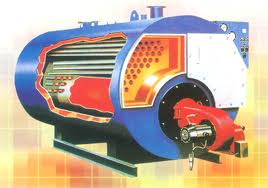
Xiao Bian explores the risks of boiler explosions and shares essential preventive measures. Gas boilers, although widely used for heating and industrial purposes, are prone to dangerous incidents due to various factors. These explosions not only cause significant economic damage but also lead to severe injuries or even fatalities. Therefore, understanding the hazards associated with gas boilers and implementing proper safety measures is crucial for preventing such tragedies.
1. Gas Boiler and Its Applications
1.1 Understanding the Structure of a Gas Boiler
A gas-fired boiler consists of two main systems: the combustion equipment and the boiler itself. The combustion system includes the furnace, burners, and other related components that are responsible for mixing fuel and air, then igniting them to produce heat. This heat is then transferred to water inside the boiler, which turns into steam at a specific pressure and temperature. The entire process involves controlled combustion, heat transfer, and steam generation, making it a critical part of many industrial and residential systems.
1.2 Common Applications of Gas Boilers
Gas-fired boilers are extensively used in power generation, manufacturing, chemical processing, textile, and paper industries. They are also commonly found in hotels, commercial buildings, and residential areas for heating and hot water supply. In northern China, where cold weather is common, gas boilers play an essential role in maintaining indoor comfort. Over time, these systems have become integral to daily life, highlighting the importance of their safe operation.
2. Types of Gas Boiler Explosions and Their Hazards
Gas boiler accidents can generally be categorized into three levels:
(1) Extraordinary Accidents: These involve the explosion of major pressure-bearing components like the drum or tube sheet, resulting in severe damage to equipment, infrastructure, and personnel. Such events often lead to major financial losses and long-term operational disruptions.
(2) Major Accidents: These occur when the boiler is forced to shut down due to issues like water shortage or furnace explosions. Although less severe than extraordinary accidents, they can still cause significant damage, personal injury, and production halts, leading to substantial economic impact.
(3) Minor Accidents: These are incidents that can be resolved quickly without causing major consequences. However, they still pose risks and should not be ignored. Gas boiler explosions are among the most dangerous types of industrial thermal accidents, typically falling into two categories: furnace explosions and backfire explosions.
3. Analysis of Fire Hazards in Gas-Fired Boilers
3.1 Flammable Nature of Gas
Gas-fired boilers primarily use natural gas or liquefied petroleum gas (LPG), both of which are highly flammable. Methane, the main component of natural gas, has an explosive limit of 4% to 15%, while LPG has a slightly higher range. If gas leaks and mixes with air within this explosive range, it can ignite easily if exposed to a spark or flame, leading to catastrophic results.
3.2 Risk of Furnace Explosions
Furnace explosions typically occur when unburned gas accumulates inside the combustion chamber and mixes with air. If this mixture reaches the explosive limit and comes into contact with an ignition source, it can result in a powerful explosion. This risk is especially high during boiler startup or if there's a failure in the purge system, making regular maintenance and safety checks vital for prevention.
Aluminium Copper Air Conditioning Connecting Pipe
AC insulated copper pipe,Insulated Air Conditioner Copper Aluminium Tube/Pipe
Suzhou Green New Material Technology Co., Ltd. , https://www.szgreenvip.com
